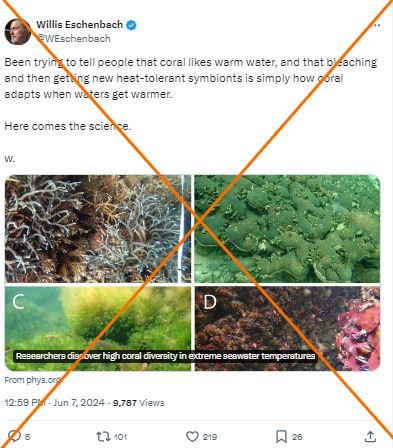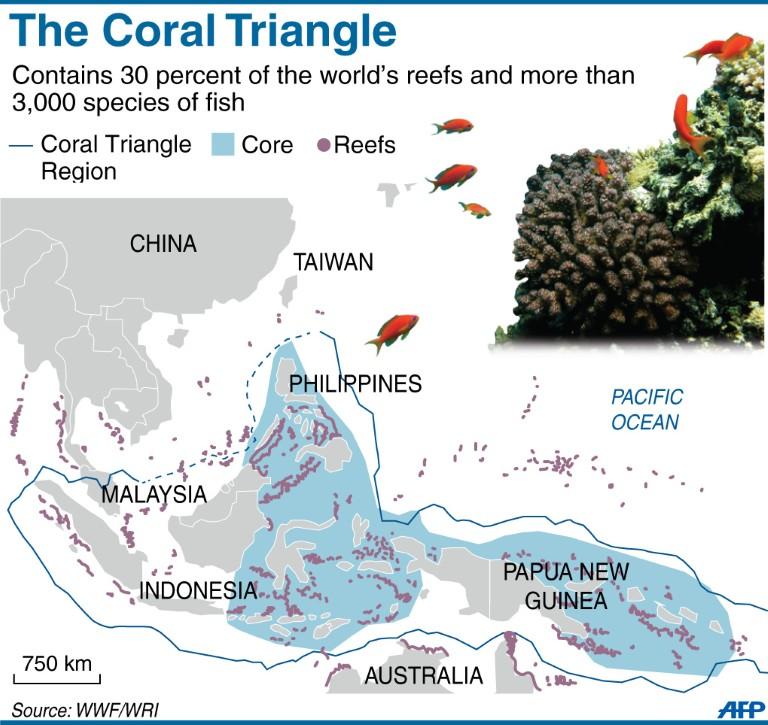
Posts misrepresent study on coral, warmer oceans
- This article is more than one year old.
- Published on July 23, 2024 at 19:00
- 3 min read
- By Manon JACOB, AFP USA
"Been trying to tell people that coral likes warm water, and that bleaching and then getting new heat-tolerant symbionts is simply how coral adapts when waters get warmer. Here comes the science," a June 7, 2024 post on X says, linking to coverage of a recent study on marine biodiversity under extreme environmental conditions (archived here and here).
The claim circulated elsewhere in English and in Italian.

This year, Earth experienced its fourth global bleaching event (archived here) on record -- and the second in a decade -- a phenomenon that is boosted by human-caused global warming (archived here) according to scientists.
"Climate model predictions for coral reefs have been suggesting for years that bleaching impacts would increase in frequency and magnitude as the ocean warms," Jennifer Koss, director of National Oceanic and Atmospheric Administration's Coral Reef Conservation Program, said in a statement in April.
Yet, the posts are the latest in a series of claims misrepresenting the impact of warming oceans on coral health, focusing this this time on a study about marine lakes of the Raja Ampat region in Indonesia (archived here, here and here).
Study co-author Adriana Alzate (archived here), told AFP on July 18 that the portrayal of "thriving corals" in warmer temperatures oversimplifies the issue at hand and "misrepresents the significant biodiversity loss and ecological changes occurring in coral reef ecosystems worldwide."
Corals in marine lakes are predominantly massive, submassive and encrusting species (archived here) as they have been found to be more resilient to extreme weather conditions (archived here).
Diversity at risk
The region in the study is part of the Coral Triangle, a global hotspot for biodiversity that is home to more than 600 reef-building coral species -- which represents about 75 percent of all species known to science -- and 3,000 species of reef fish, according to the US National Oceanic and Atmospheric Administration Ocean Exploration team (archived here and here).
In contrast, the Caribbean seas account for only 65 to 75 reef-building coral varieties (archived here).

Warming effects oceans through sea level rise due to thermal expansion, ocean acidification and coral bleaching and the Coral Triangle is no stranger to such impacts.
Scientists have previously reported coral disease -- including bleaching -- in Raja Ampat (archived here).
The 2024 study on the region "found that marine lakes in warmer conditions (up to 31 degrees Celsius or 88 Fahrenheit) host 37 species of hard corals."
"This is only 7 percent of the regional diversity and means that 93 percent of the coral species are lost in these warmer waters," Wageningen University's Alzate said.
Additionally, the posts misrepresent what adaptation means for ocean ecosystems.
"Corals do not simply 'adapt' to warmer water through bleaching and acquiring new symbionts," she said.
Any potential adaptation depends on a variety of genetic and environmental factors.
"Adaptation in corals, or any organism, refers to a population-level process, not something that can happen in the lifetime of a single individual. It is not about individual corals adapting instantaneously to new conditions," Alzate said.
"While the study suggests that some corals may have the potential to adapt to higher temperatures, this is a long-term process and does not address the immediate and severe threats corals face today."
Rapid warming
Oceans are warming at a rapid pace, which disrupts the fragile balance of entire underwater ecosystems.
NASA scientists estimate that 90 percent of global warming occurs in oceans (archived here), as water absorbs heat generated by human carbon emissions.
Reefs have persisted for millennia, but researchers are now increasingly examining the effect of rapid, repeated and intense bleaching on ecosystems.
According to Terry Hughes, prominent coral scientist and director of the Australian Research Council Centre of Excellence for Coral Reef Studies (archived here), the key is to examine how "the mix of species that occur on or near reefs changed in recent times" (archived here).
The United Nations Intergovernmental Panel on Climate Change says "further reef degradation due to future climate change now seems inevitable, with serious consequences for other marine and coastal ecosystems" (archived here).
More of AFP's reporting on climate misinformation is available here.
Copyright © AFP 2017-2026. Any commercial use of this content requires a subscription. Click here to find out more.
Is there content that you would like AFP to fact-check? Get in touch.
Contact us




